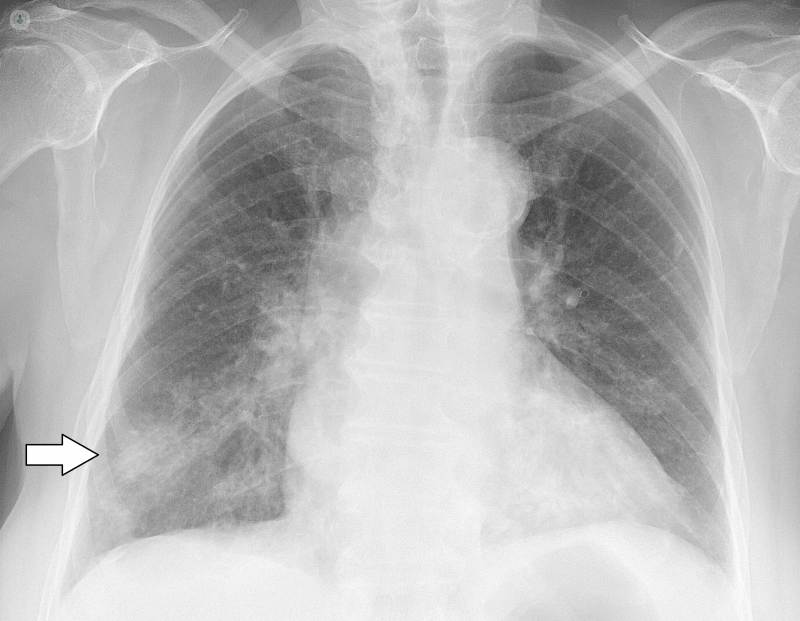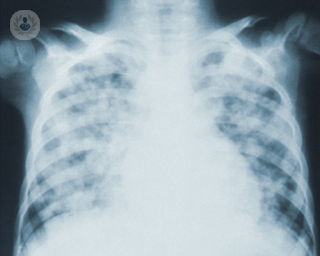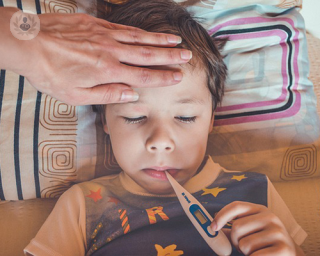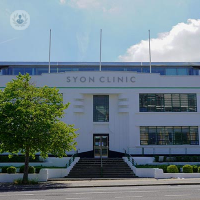What is a respiratory infection?
An acute respiratory infection (ARI) is a disease of the respiratory tract that evolves in a period of fewer than 15 days, often turning into pneumonia. It is usually classified into three types according to the degree of complication:
- ARI without pneumonia
- ARI with mild pneumonia
- ARI with severe pneumonia

What are the symptoms of a respiratory infection?
The symptoms depend on the type of infection:
- ARI without pneumonia: abundant fluid in the nose, cough, fever, otorrhea (ear discharge), sore throat, dysphonia, exudate (fluid emitted through pores or a wound) in the pharynx.
- ARI with mild pneumonia: previous symptoms with tachypnea (increase in respiratory rate above normal values).
- ARI with severe pneumonia: previous symptoms with cyanosis (blue discoloration of the skin), increased respiratory distress.
What are the causes of a respiratory infection?
There are several factors that can cause a respiratory infection:
- Environmental: pollution, lack of ventilation in the home, passive smoking, sudden changes in temperature, contagion.
- Individual: age (affects babies under the age of one more frequently), low birth weight, previous infections, malnutrition, lack of vitamin A, not being vaccinated according to recommendations.
Can a respiratory infection be prevented?
Some factors may help to avoid respiratory infection in children:
- Breastfeed your baby for the first four to six months (if possible)
- Provide a healthy, balanced diet
- Do not smoke near children
- Not using charcoal or burning wood in closed places
- Providing the adequate clothing for the season (e.g in winter, wearing a hat and scarf)
- Avoiding sudden changes in temperature
- Giving them foods which contain vitamins A and C
- Ventilating rooms properly
- Making sure they drink plenty of fluids
What is the treatment for respiratory infection?
Respiratory infection is often first treated with antibiotics, and if the infection is caused by severe flu, with an antiviral medication. If the situation worsens, oxygen therapy can also be performed and, if there are complications, bronchodilator medication may be needed.
12-29-2015 06-20-2023Respiratory infection
Dr James Ramsay - Pulmonology & respiratory medicine
Created on: 12-29-2015
Updated on: 06-20-2023
Edited by: Aoife Maguire
What is a respiratory infection?
An acute respiratory infection (ARI) is a disease of the respiratory tract that evolves in a period of fewer than 15 days, often turning into pneumonia. It is usually classified into three types according to the degree of complication:
- ARI without pneumonia
- ARI with mild pneumonia
- ARI with severe pneumonia

What are the symptoms of a respiratory infection?
The symptoms depend on the type of infection:
- ARI without pneumonia: abundant fluid in the nose, cough, fever, otorrhea (ear discharge), sore throat, dysphonia, exudate (fluid emitted through pores or a wound) in the pharynx.
- ARI with mild pneumonia: previous symptoms with tachypnea (increase in respiratory rate above normal values).
- ARI with severe pneumonia: previous symptoms with cyanosis (blue discoloration of the skin), increased respiratory distress.
What are the causes of a respiratory infection?
There are several factors that can cause a respiratory infection:
- Environmental: pollution, lack of ventilation in the home, passive smoking, sudden changes in temperature, contagion.
- Individual: age (affects babies under the age of one more frequently), low birth weight, previous infections, malnutrition, lack of vitamin A, not being vaccinated according to recommendations.
Can a respiratory infection be prevented?
Some factors may help to avoid respiratory infection in children:
- Breastfeed your baby for the first four to six months (if possible)
- Provide a healthy, balanced diet
- Do not smoke near children
- Not using charcoal or burning wood in closed places
- Providing the adequate clothing for the season (e.g in winter, wearing a hat and scarf)
- Avoiding sudden changes in temperature
- Giving them foods which contain vitamins A and C
- Ventilating rooms properly
- Making sure they drink plenty of fluids
What is the treatment for respiratory infection?
Respiratory infection is often first treated with antibiotics, and if the infection is caused by severe flu, with an antiviral medication. If the situation worsens, oxygen therapy can also be performed and, if there are complications, bronchodilator medication may be needed.


Shortness of breath: causes and treatment
By Dr Farid Bazari
2024-11-19
The medical term for shortness of breath is known as dyspnea. If it's severe or persistent, it's likely to mean there is an underlying medical condition. We spoke to leading medical specialist and pulmonologist, Dr Farid Bazari, who highlighted some of the causes of breathing problems and how they should be treated. If you're experiencing symptoms do not hesitate to seek help. See more


Respiratory infections in children
By Dr Theofilos Polychronakis
2024-11-14
There are several different types of respiratory infections which can develop in children. Respiratory infections which commonly occur in children include the common cold (which often develops during autumn and winter), bronchitis, pneumonia, and croup. Croup is particularly common within children aged between 6 months and 3 years old. See more


A guide to respiratory infections
By Dr Anjani Prasad
2024-11-13
Winter approaches on swift winds which means it’s the perfect time to be prepared for respiratory infections, which affect the throat, sinuses, airways, and lungs. We spoke to a leading consultant pulmonologist to tell us about respiratory tract infections, and how to know when cough syrup won’t be enough. See more
Experts in Respiratory infection
-
Professor Indranil Chakravorty
Pulmonology & respiratory medicineExpert in:
- Asthma
- Chronic obstructive pulmonary disease (COPD)
- Sleep disorders
- Bronchiectasis
- Cough
- Respiratory infection
-
Professor Margaret Johnson
Pulmonology & respiratory medicineExpert in:
- Respiratory infection
- Chest infection
- Coronavirus
- Lung cancer
- Asthma
- Chronic obstructive pulmonary disease (COPD)
-
Professor Parviz Habibi
Paediatric respiratory medicineExpert in:
- Breathing problems
- Paediatrics
- Sleep disorders
- Respiratory infection
- Chest infection
- Obstructive sleep apnea
-
Dr Theofilos Polychronakis
PaediatricsExpert in:
- Breathing problems
- Chronic cough
- Sleep disorders
- Asthma in children
- Respiratory infection
- Rhinitis
-
Dr Silvia Pierini
PaediatricsExpert in:
- Respiratory infection
- Newborn physical examination
- Child nutrition
- Breastfeeding
- Faltering growth
- Ear infection
- See all

Syon Clinic - part of Circle Health Group
Syon Clinic - part of Circle Health Group
941 Great West Rd, Brentford TW8 9DU
No existe teléfono en el centro.
By using the telephone number provided by TOP DOCTORS, you automatically agree to let us use your phone number for statistical and commercial purposes. For further information, read our Privacy Policy
Top Doctors

The Chiltern Hospital - part of Circle Health Group
The Chiltern Hospital - part of Circle Health Group
London Rd, Great Missenden HP16 0EN
No existe teléfono en el centro.
By using the telephone number provided by TOP DOCTORS, you automatically agree to let us use your phone number for statistical and commercial purposes. For further information, read our Privacy Policy
Top Doctors

The Harborne Hospital - part of HCA Healthcare
The Harborne Hospital - part of HCA Healthcare
Mindelsohn Way, B15 2FQ
No existe teléfono en el centro.
By using the telephone number provided by TOP DOCTORS, you automatically agree to let us use your phone number for statistical and commercial purposes. For further information, read our Privacy Policy
Top Doctors
-
Syon Clinic - part of Circle Health Group
941 Great West Rd, Brentford TW8 9DU, West LondonExpert in:
- Allergies nose and ears
- Allergy Dermatitis
- Allergy
- Clinical analysis
- Anxiety
- Digestive
-
The Chiltern Hospital - part of Circle Health Group
London Rd, Great Missenden HP16 0EN, Great MissendenExpert in:
- Allergies Ophthalmological
- Clinical analysis
- Cancer
- Breast Cancer
- Skin Cancer
- Prostate Cancer
-
The Harborne Hospital - part of HCA Healthcare
Mindelsohn Way, B15 2FQ, BirminghamExpert in:
- Digestive
- Cancer
- Orthopaedic surgery
- Thoracic Surgery
- Diagnostic Imaging
- Obstetrics and Gynaecology
- See all
- Most viewed diseases, medical tests, and treatments
- Migraine
- Paediatric rheumatology
- Autoimmune diseases
- Joint pain
- Child nutrition
- Nutrition
- Weight loss injections
- Abdominal pain
- Bariatric surgery
- One Stop Breast Clinic








